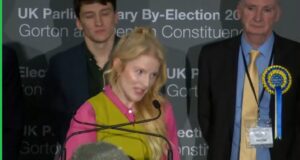THE “BREXIT” crisis is over for now and the Government is unlikely to fall before the end of the year – but Theresa May’s problems are by no means over. The first phase of negotiations are over – some 18 months after the referendum vote to leave the European Union (EU).
The lump sum the UK will have to pay as its exit “dowry” has been agreed, but not disclosed. It was talked up in recent weeks as possibly being as much as £50 billion – the final figure is reported to be between £35 billion and £39 billion, which most commentators have interpreted as a success. If Nigel Farage had acknowledged that it would cost this kind of money to leave the EU, he might not have won his referendum.
The problem over the border between the north and south of Ireland has been solved – by shelving it, to be tackled in the second round of talks. May has agreed there will not be a physical border with customs posts – but what other kind of border will it be? Either the UK as a whole agrees a free trade deal with the EU, which would remove any need for customs inspections – or it agrees such a deal for the North of Ireland, perhaps with customs checks for people travelling from the North of Ireland to the UK mainland. There really isn’t a third option – though whichever option is chosen may be presented as a transitional measure, to get agreement and shelve the problems yet again. The border issue has been presented as if it was only about the movement of goods, but if the UK is to take control of immigration, as the Brexiters want, the issue of movement of people will also have to be tackled at some point.
Freedom of movement will end – which is probably the greatest loss, which Brits will experience as they try to holiday in Spain or head to Dublin for a stag weekend and find themselves having to queue up at border control and shell out for medical insurance. There is much more detail to be sorted out on this issue. Brits already living in EU countries and citizens of EU member states already living in the UK will be allowed to stay – but new generations will lose the freedom to live where they wish. This may reduce the UK’s supply of cheap labour: expect to see many more Universal Credit claimants forced into low paid work.
The issue over the European Court is the only sticking point which has been solved with a workable compromise. EU citizens living in the UK are to be allowed to submit to or invoke its jurisdiction, probably for a limited period of eight years. This allows the Tories to claim they have freed the UK from being ruled by European Courts, while the EU can claim it has protected its own citizens’ rights.
Attention will now turn to the issue of trade. Both sides will want to see this massive issue resolved in around ten months – the same sort of time as was needed for the first stage of negotiations, in which there was very much less to discuss. This will allow time for EU member state governments to examine and endorse the final deal. Technically any one state could veto the final deal – putting Brexit back to square one. What kind of vote the UK Parliament will be allowed to have remains to be seen.
The value of the UK currency, the pound sterling, has risen against the euro as the banks and shady finance companies that run the world economy have been reassured by the reaching of a Stage One agreement. This confidence is unlikely to remain once the two sides get down to Stage Two of the negotiations. As we enter the new year, Brexiters will come under pressure to reveal just where these new trade deals that the EU has supposedly precluded the UK from concluding are to come from.
Theresa May knows where she will be spending this Christmas. She knows there are no guarantees over where she will spend the next one.
•Read more about it:
Cllr Rabina Khan says Bungle-Biggs forgot Brexit!
Brexit threatens UK food stability
[Adverts]
 East London News A Force for the community…
East London News A Force for the community…




